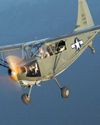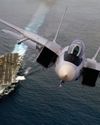THE BEST WWII FIGHTERS
Flight Journal
|Annual 2020
Which was number one?

When the editors of Flight Journal asked me to write about all the great WW II fighters and to choose one as “the best,” I thought, “What an ego trip!” The selections would be easy to dig out of my dusty flight-report files (which document my evaluations of WW II fighter types) and out of books in my aviation collection.
I test-flew several versions of these fighters during the Joint Army/Navy Fighter Conference at NAS Patuxent in October 1944 and also fighters that had been passed between Navy and Air Corps contractors for test-pilot evaluations: the F4U-1, F4U-1D, F4U-4 Corsair; P-51B, P-51D, H Mustang; P-38D, M Lightning; P-47B, P-47D, N Thunderbolt; P-40N Warhawk and P-39 Airacobra; P-63 King Cobra; F4F Wildcat; F6F Hellcat; Supermarine Seafire (a carrier version of the famous Spitfire); the Mosquito and the Japanese A6M5 Zero.
These flight evaluations weren’t merely joyrides to add hours to my logbook; they had been set up to investigate the fighters’ known good and bad flight characteristics and performance capabilities during simulated gunnery runs against other fighters and during dive-bombing runs against targets. I wrote a comprehensive report on every fighter so that Grumman engineers would be able to incorporate—or steer clear of—these features in future designs.
Picking the “best” fighter, however, went way past my experiences as a test pilot. It involved the consideration of a very complex series of operational factors. On top of that, the land-based war in Europe and the island-hopping war in Japan, in which carrier-based aviation played such a vital part, would have to be considered separately.
“BEST FIGHTER” SELECTION CRITERIA
Esta historia es de la edición Annual 2020 de Flight Journal.
Suscríbete a Magzter GOLD para acceder a miles de historias premium seleccionadas y a más de 9000 revistas y periódicos.
¿Ya eres suscriptor? Iniciar sesión
MÁS HISTORIAS DE Flight Journal

Flight Journal
ELLIPTICAL ELEGANCE
Flying and evaluating the Seafire Mark III
4 mins
November - December 2025

Flight Journal
IRON DOG
Fighting the Pacific and the P-39 at the same time
14 mins
November - December 2025

Flight Journal
Fighter Pilots: A Warrior Clan
TAKE A HARD LOOK at the two young men in these photos. Do they look as if they were bent on killing one another? On the left we have a young, unknown enlisted Japanese pilot standing in front of a Nakajima Ki-27 \"Nate,\" one of Japan's earliest monoplanes that led to the much vaunted Zero.
3 mins
November - December 2025

Flight Journal
KEN WALSH THE FIRST CORSAIR ACE
Medal of Honor pilot's combat adventures
12 mins
November - December 2025

Flight Journal
Big Chief's Little Chief
Thunderbolt action with the Wolf Pack
11 mins
November - December 2025

Flight Journal
ENEMY PILOTS SPEAK Voices from the other side
All too often American students of air warfare forget that enemy aircraftwhether Messerschmitts or MiGs-were flown by human beings with the same motivations and traits as Allied airmen. More often than not, the only difference between friend and foe was the paint on the airplane and where they landed. Therefore, we've assembled a variety of accounts from WW II Axis fighter pilots, men who were more than simply targets.
11 mins
November - December 2025

Flight Journal
FLYING THE FW 190
A legend gets checked out in the Butcher Bird
15 mins
November - December 2025

Flight Journal
DOUBLE-THEATER ACE
The fearless missions of legendary fighter pilot Col. John D. Landers
12 mins
November - December 2025

Flight Journal
WARBUG IN THE PACIFIC
Surviving combat in a Stinson OY-1/L-5
10 mins
September - October 2025

Flight Journal
WINGS OF THE FLEET
Celebrating the U.S. Navy's 250-year legacy
9 mins
September - October 2025
Translate
Change font size

